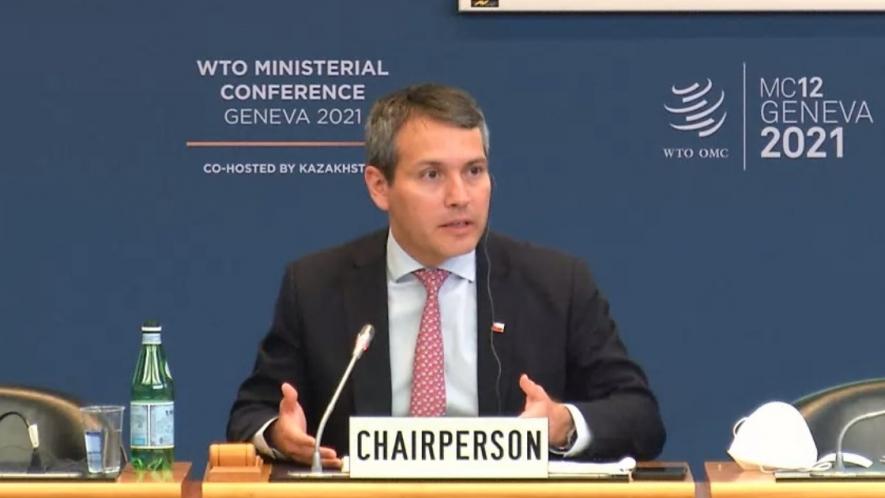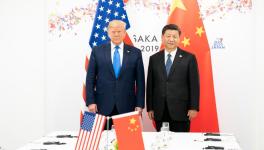Why Should Health Activists Care About WTO’s Agenda?

For the first time in 4 years, trade ministers from the World Trade Organization’s (WTO) constituency were supposed to hold an in person meeting in Geneva from November 30 to December 3. The meeting was cancelled at the last minute as European governments started introducing strict travel restrictions because of the Omicron variant – but the agenda the ministers were supposed to discuss remains important in spite of the cancellation.
The WTO meeting was quite out of the ordinary because its relevance was recognized not only by trade activists, but also by those campaigning for the right to health. A great deal of that recognition came from the fact that the meeting was supposed to discuss the TRIPS waiver proposal, but it would be wrong to say that this was the only agenda point relevant to global health.
Over the years, the WTO has passed a number of guidance and binding documents that have weakened public health systems. In fact, by upholding the current capitalist system and promoting its values, the WTO has had a significant impact on the world’s health, making it an important area of focus for health activists.
Plurilateral negotiations: a new strategy for marginalizing developing states in WTO?
This MC is also unique because the issues under discussion have been shaped by so-called plurilateral processes – negotiations involving only some WTO member states rather than multilateral negotiations (involving all countries) that should be used to arrive at binding decisions. Plurilateral negotiations are not officially recognized in WTO rules, yet they are being used to create so-called Joint Statement Initiatives (JSI) endorsed by subsets of WTO member states.
JSIs have been developed on e-commerce, investment facilitation and domestic services regulation. In their current guise, they all favor the interests of developed countries by limiting the amount of regulation transnational corporations (TNCs) can be subjected to by governments. Even though plurilateral negotiations do not have official standing in WTO procedures, the plan seems to be that if enough countries endorse the JSIs, this will demonstrate popular support for the proposals and result in them being adopted as official policy.
While at first sight, it might seem that domestic services regulation, e-commerce, and fisheries and agriculture have little to do with health, in practice, their impact can be extensive. For example, the measures that are being proposed in the realms of fisheries and agriculture could have an extremely negative impact on farmers and fishers in the Global South because they limit subsidies to small fishers in developing countries, while allowing subsidies to large-scale fishers in developed countries as long as they can demonstrate that the industrial-scale fishing they do is at a “biologically sustainable level.” This kind of subsidy system will undermine both the food security and livelihoods of the most marginalized fishing communities and their dependents. It also legitimates a system that reduces biodiversity, contributes to the emergence of zoonotic diseases, and emphasizes scale and efficiency rather than access to nutritious and culturally appropriate food.
Trade rules that would limit the space for public investment in health
Countries of the Global North and private corporations continue to enjoy a particularly favorable position in all points scheduled for discussion at the WTO. In the case of e-commerce, efforts are being made to limit national-level regulation of big tech companies. Current proposals include allowing health insurance companies to access people’s data and use it for determining premiums.
Aside from using personal data to regulate access to life-sustaining health services, big tech companies also use algorithms for this purpose. A growing body of research demonstrates that algorithms have racial, gender and cultural biases encoded in them. Any shift towards increased digitization of health services using such algorithms is likely to compound existing inequalities especially if, as the current proposals suggest, governments won’t have the ability to regulate their use or the processes used to create them. These problems are not restricted to the private sector. They are also likely to affect the quality of public services because public institutions increasingly rely on big tech companies to provide them with the digital infrastructure they need to deliver essential services.
When it comes to regulating domestic services, the proposed plan could lead to opening the field for foreign corporations in local health systems, while limiting countries’ ability to regulate actions that may lead to harmful health outcomes. It also limits countries’ ability to invest in public health systems.
The position of low and middle income countries (LMIC) in the WTO is at best precarious, and it has been rendered even more so by the measures introduced after the beginning of the pandemic. Many delegates could not have attended the meeting even before the Omicron variant stirred the situation up because of vaccine apartheid, and those who would have participated online would not have the right to take part in the discussion. Most worryingly, their non-participation could have been interpreted as agreement with the policies discussed, which would deal a heavy blow to their social security systems and economies as at the WTO, silence is interpreted as consent.
The Walker Process against a TRIPS waiver
This issue has been raised by many countries, including India, especially when they referred to the so-called Walker Process, which is supposed to finalize WTO’s ‘multilateral and horizontal’ response to the Covid-19 pandemic. Instead, the Walker Process seems to be focusing on increasing the access of developed countries to developing markets to facilitate the sale of consumer goods that are not medically indicated for the management of Covid-19, and includes thematic discussions on export restrictions, trade facilitation, regulatory coherence, cooperation and tariffs.
It makes no mention of the TRIPS waiver proposal, siding in this way with the interest of the countries of the Ottawa group and those who have been blocking the waiver proposal since last year. By doing so, the Walker Process is taking the world further away from a real solution to the pandemic, sacrificing lives in the Global South to preserve the profits of pharmaceutical companies based in the North.
And while it might seem that the cancellation of MC 12 has brought additional stalling when it comes to the TRIPS waiver proposal, it should be taken into consideration that WTO members can pass it independently of a meeting of their ministers. The decision to endorse the waiver can be made by the WTO General Council, which meets on a more regular basis and whose session has replaced the MC. Considering the time-sensitive nature of the global emergency, the TRIPS waiver could have long been endorsed by the General Council – and it can be endorsed now, helping to prevent even more deaths caused by vaccine apartheid.
To ensure this, the role of health activists is crucial: to pressure their local health and trade ministers to adopt a more progressive stance, but also to raise their voices against the harmful effects current trade practices are having on people’s health.
Read more articles from the latest edition of the People’s Health Dispatch and subscribe to the newsletter here.
Originally Published in the Peoples Dispatch
Get the latest reports & analysis with people's perspective on Protests, movements & deep analytical videos, discussions of the current affairs in your Telegram app. Subscribe to NewsClick's Telegram channel & get Real-Time updates on stories, as they get published on our website.
























